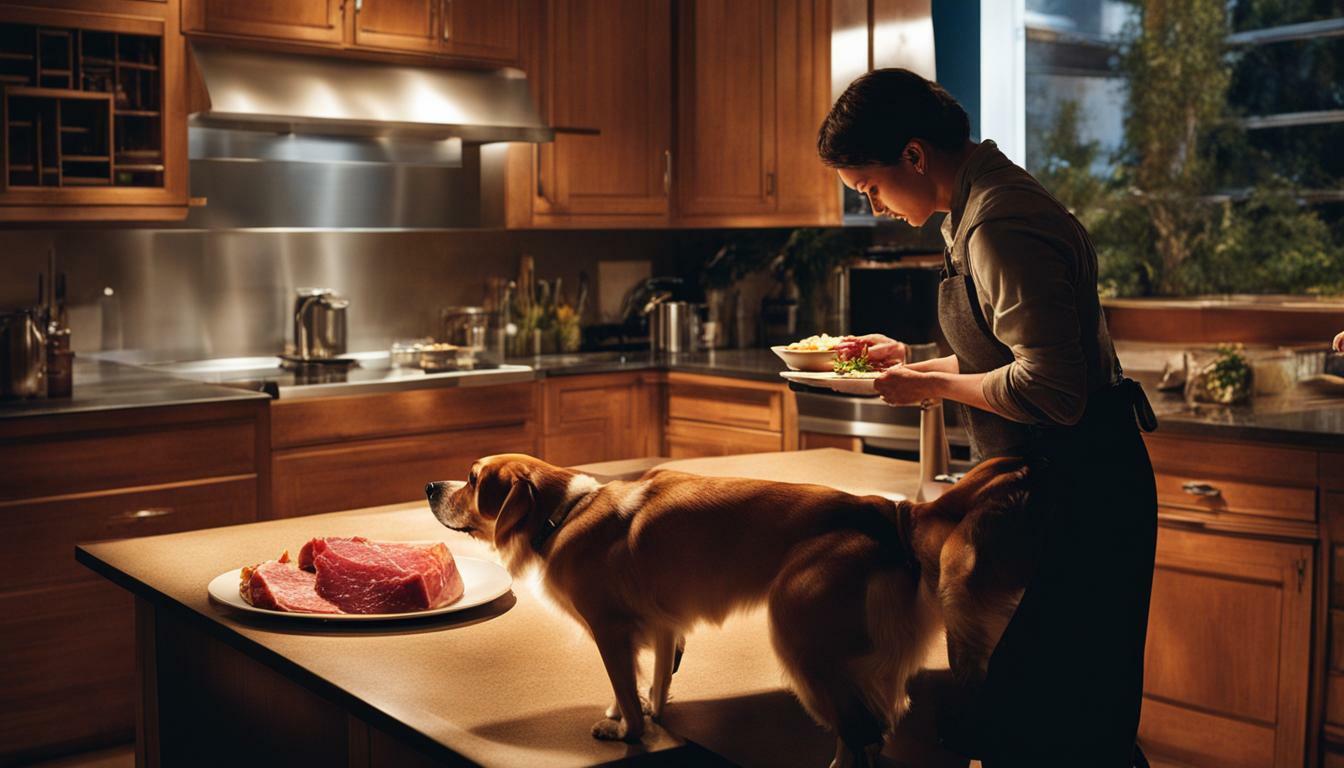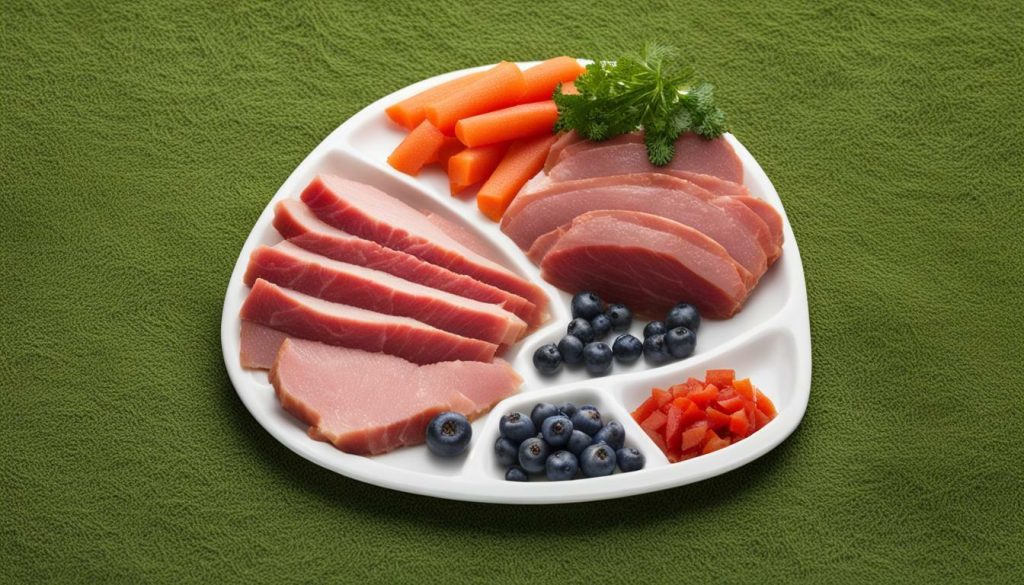
Are you wondering whether it’s safe for dogs to consume ham? Let’s unravel the truth about feeding ham to your furry friends and explore safer meat choices for their well-being.
Factual data: Ham is not advisable for dogs to eat due to its high sodium, preservatives, and fat content. It can lead to health issues such as dehydration, pancreatitis, and bacterial infections. While a small sliver of ham occasionally may not harm your dog, it is better to opt for healthier protein sources like chicken, turkey, or beef. Lean proteins like fish, yogurt, and eggs are also good options. Fruits and vegetables such as blueberries, bananas, carrots, and green beans can supplement a dog’s diet. Commercial dog food and homemade recipes should be consulted with a veterinarian. It is important to remove bones and excess fat from ham before feeding it to dogs, and to cook it through boiling or baking. Portion control and moderation are key to avoid health complications in dogs.
Key Takeaways:
- Ham is not recommended for dogs due to its high sodium, preservatives, and fat content.
- Feeding ham to dogs can lead to health issues like dehydration, pancreatitis, and bacterial infections.
- Opt for healthier protein sources such as chicken, turkey, beef, fish, yogurt, and eggs.
- Supplement your dog’s diet with fruits and vegetables like blueberries, bananas, carrots, and green beans for added nutrition.
- Consult with a veterinarian for personalized advice on your dog’s diet, including commercial dog food and homemade recipes.
The Risks of Giving Ham to Dogs
Before you reach for that slice of ham to share with your pup, it’s important to understand the potential risks involved and how it can affect your dog’s overall well-being. While ham may be a popular meat option for humans, it is not advisable for dogs to consume regularly.
One of the main concerns with feeding ham to dogs is its high sodium content. Dogs have different dietary needs than humans, and excessive sodium can lead to dehydration and kidney issues. Additionally, ham often contains preservatives such as nitrates and nitrites, which can be harmful to dogs and may even be linked to certain types of cancer.
Another risk of giving ham to dogs is its high fat content. Consuming fatty foods can lead to pancreatitis, a painful condition that causes inflammation of the pancreas. Symptoms of pancreatitis in dogs include vomiting, diarrhea, abdominal pain, and loss of appetite. In severe cases, it can be life-threatening.
| Risk | Potential Consequences |
|---|---|
| High sodium content | Dehydration, kidney issues |
| Preservatives (nitrates and nitrites) | Possible link to cancer |
| High fat content | Pancreatitis |
Feeding your dog a small sliver of ham occasionally may not cause immediate harm, but it’s always best to err on the side of caution. Instead, consider opting for healthier protein sources such as chicken, turkey, or beef, which are lower in sodium and fat. Lean proteins like fish, yogurt, and eggs can also be included in your dog’s diet.
Supplementing your dog’s diet with fruits and vegetables can provide additional nutrients. Blueberries, bananas, carrots, and green beans are all safe options that can be given as treats or added to meals. However, it’s important to consult with your veterinarian before introducing any new foods to your dog’s diet.
When it comes to feeding ham to dogs, proper preparation is key. Remove any bones and excess fat before giving it to your dog, as these can pose choking hazards and contribute to weight gain. Additionally, cooking the ham through boiling or baking can help eliminate any potential bacteria that may be present.
Remember, portion control and moderation are essential to keeping your dog healthy. While your furry friend may beg for a taste of your ham, it’s important to prioritize their well-being and choose safer food options that meet their specific dietary needs.

While ham may be a favorite human delicacy, it poses some serious health hazards for our canine companions. Let’s explore why ham might not be the best choice for your dog’s diet and discuss alternative protein sources that can provide similar nutritional benefits.
One of the main concerns with feeding ham to dogs is its high sodium content. Sodium can lead to dehydration and increase the risk of kidney problems in dogs. Additionally, ham is often processed with preservatives such as nitrates and nitrites, which can be harmful to a dog’s health. These preservatives have been linked to gastrointestinal issues and even certain types of cancer in dogs.
The high fat content in ham is another reason to avoid feeding it to your dog. Dogs that consume fatty foods like ham are more susceptible to pancreatitis, a painful inflammation of the pancreas. Pancreatitis can cause symptoms such as vomiting, diarrhea, and abdominal pain, and in severe cases, it can be life-threatening for dogs.
Instead of ham, consider incorporating alternative protein sources into your dog’s diet. Lean meats like chicken, turkey, and beef are excellent choices that provide essential nutrients without the high sodium and fat content of ham. Fish, yogurt, and eggs are also good options that can offer similar nutritional benefits. Additionally, fruits and vegetables such as blueberries, bananas, carrots, and green beans can serve as healthy supplements to your dog’s meals.
| Alternative Protein Sources | Nutritional Benefits |
|---|---|
| Chicken | High in lean protein, vitamins, and minerals |
| Turkey | Rich in lean protein and low in fat |
| Beef | Good source of protein, iron, and zinc |
| Fish | Provides omega-3 fatty acids for a healthy coat and skin |
| Yogurt | Contains probiotics that promote digestive health |
| Eggs | Rich in protein and essential amino acids |
Remember to consult with your veterinarian before making any significant changes to your dog’s diet. They can provide personalized advice based on your dog’s specific needs and health conditions. It’s important to remove bones and excess fat from any meat before feeding it to your dog, and when cooking meat, opt for boiling or baking methods instead of frying to minimize the fat content.
Portion control and moderation are key when introducing any new food to your dog’s diet. While a small sliver of ham occasionally may not harm your dog, it’s best to prioritize their overall health and wellbeing by choosing safer and healthier protein sources over ham.

When it comes to indulging our dogs, it’s essential to be aware of the high sodium and fat content in ham, as these can have adverse effects on their overall well-being. While ham may be a tasty treat for humans, it can pose significant health risks for our furry friends.
Ham is often cured with large amounts of salt and other preservatives, which can lead to excessive sodium intake in dogs. This can cause dehydration, increased thirst, and potentially lead to electrolyte imbalances that can be harmful to their health. Additionally, the high fat content in ham can put strain on a dog’s digestive system, leading to gastrointestinal issues such as pancreatitis.
To ensure the well-being of your four-legged companion, it’s important to consider alternative protein sources that are lower in sodium and fat. Lean proteins like chicken, turkey, or beef are excellent options that provide essential nutrients without the harmful additives found in ham. Fish, yogurt, and eggs are also great choices to diversify their diet and offer variety in flavors.
| Protein Sources | Benefits |
|---|---|
| Chicken | High in lean protein, low in fat |
| Turkey | Rich in essential nutrients, low in sodium |
| Beef | Good source of iron and zinc |
| Fish | Omega-3 fatty acids for coat and skin health |
| Yogurt | Provides probiotics for digestive health |
| Eggs | Rich in protein and beneficial amino acids |
Incorporating fruits and vegetables into your dog’s diet can also offer additional nutritional benefits. Blueberries are packed with antioxidants, bananas provide potassium, carrots are a good source of fiber, and green beans offer vitamins and minerals. However, it’s important to consult with a veterinarian to ensure the specific fruits and vegetables are safe for your dog, as some may be toxic to certain breeds.
Remember, moderation is key when it comes to treating your dog. While a small sliver of ham occasionally may not cause harm, it’s best to avoid it as a regular indulgence. Always remove any bones and excess fat from ham before feeding it to your dog, and ensure it is cooked thoroughly through boiling or baking to eliminate any potential bacterial contamination.

By being mindful of the high sodium and fat content in ham, and opting for healthier protein sources and supplemented fruits and vegetables, you can provide your dog with a balanced and nutritious diet. As always, it’s crucial to consult with a veterinarian to determine the best dietary choices for your pet’s individual needs.
Ham and the Risk of Dehydration
Did you know that feeding ham to your dog can increase the risk of dehydration? Let’s explore why this happens and how we can ensure our furry friends stay properly hydrated.
Ham is a salty and high-sodium meat, which can cause dogs to become thirsty and drink more water to compensate. However, excessive salt intake can actually have the opposite effect and lead to dehydration. When dogs consume too much salt, their bodies try to get rid of the excess by increasing urine production. This, in turn, can result in increased water loss and dehydration.
In addition to the high sodium content, ham often contains preservatives and additives that can further contribute to dehydration in dogs. These additives can put a strain on their kidneys and increase the need for hydration. It’s important to remember that dogs have different dietary needs than humans, and foods that may be safe for us can pose health risks for them.
To keep your dog properly hydrated, it’s best to avoid feeding them ham altogether. Instead, opt for healthier protein sources such as chicken, turkey, or beef. Lean proteins like fish, yogurt, and eggs can also be included in their diet. Supplementing their meals with fruits and vegetables like blueberries, bananas, carrots, and green beans can provide additional hydration and nutritional benefits.
| Protein Sources | Fruits and Vegetables |
|---|---|
| Chicken | Blueberries |
| Turkey | Bananas |
| Beef | Carrots |
| Fish | Green beans |
| Yogurt | |
| Eggs |
Consulting with a veterinarian is always recommended when it comes to your dog’s diet. They can provide personalized advice and ensure that your furry friend is getting the right nutrients in the right portions. Remember to remove any bones and excess fat from meat before feeding it to your dog, and cook it thoroughly through boiling or baking to eliminate any potential bacteria.
By prioritizing proper hydration and choosing healthier alternatives to ham, you can help keep your dog happy and healthy for years to come.

Feeding ham to dogs can potentially trigger pancreatitis, a dangerous condition that can lead to severe discomfort and health issues. Let’s delve into why ham should be off-limits to our canine companions.
Ham, although tasty for us, poses several risks to our furry friends. It contains high levels of fat and sodium, which can put a strain on a dog’s pancreas. The pancreas plays a crucial role in producing digestive enzymes, and when it becomes inflamed, it can lead to pancreatitis. This condition can cause abdominal pain, vomiting, diarrhea, and even life-threatening complications.
Additionally, ham is often processed and cured with preservatives, such as nitrates and nitrites, which can be harmful to dogs. These additives have been linked to an increased risk of certain cancers in canines. Moreover, the high salt content in ham can dehydrate dogs and potentially lead to electrolyte imbalances.
It is crucial to note that even a small sliver of ham can trigger pancreatitis in susceptible dogs. The effects may not be immediate, and continuous consumption of ham, even in small amounts, can result in long-term health issues. It is best to err on the side of caution and avoid feeding ham to your furry friend altogether.

When it comes to keeping our dogs safe and healthy, it is essential to consider alternative protein sources that are safer for them. Lean proteins like chicken, turkey, or beef can be excellent options to replace ham in their diet. These meats provide essential nutrients without the excessive fat content found in ham.
Other suitable protein sources for dogs include fish, yogurt, and eggs. Fish, such as salmon or mackerel, is rich in omega-3 fatty acids, which promote healthy skin and coat. Yogurt is packed with probiotics that can support a dog’s digestive system, and eggs provide a complete source of protein.
Remember to consult with your veterinarian before making any changes to your dog’s diet. They can provide personalized advice based on your dog’s specific needs and health condition. It is crucial to practice portion control and moderation when introducing new food items into your dog’s diet to prevent any potential health complications.
Exploring Healthier Protein Sources for Dogs
If you’re looking to provide your dog with a protein-rich diet, there are plenty of healthier options to consider besides ham. Let’s explore some safe and nutritious alternatives that your furry friend will love.
Chicken: Lean chicken is a fantastic source of protein for dogs. It is low in fat and rich in essential amino acids. Just make sure to remove the skin and any bones before feeding it to your dog. Chicken can be boiled, baked, or grilled, and served in small, bite-sized portions.
Turkey: Like chicken, turkey is a lean meat that is packed with protein. It is also a good source of vitamins and minerals. Turkey can be cooked in various ways – roasted, boiled, or even ground – and served as part of your dog’s balanced diet.
Beef: Lean cuts of beef, such as sirloin or ground beef, can be a great alternative to ham. Beef is high in protein and provides essential nutrients like iron and zinc. It’s important to cook beef thoroughly before feeding it to your dog and ensure that it is free from any added seasonings or spices.
Fish: Fish is an excellent source of protein for dogs, and it also contains omega-3 fatty acids, which are beneficial for their skin and coat health. Dogs can enjoy cooked fish like salmon, tuna, or whitefish. Just be cautious of any bones and remove them before serving.
Table: Comparison of Protein Sources
| Protein Source | Benefits |
|---|---|
| Chicken | Low in fat, rich in essential amino acids |
| Turkey | Lean meat, good source of vitamins and minerals |
| Beef | High in protein, provides essential nutrients |
| Fish | Rich in protein and omega-3 fatty acids |
Yogurt and Eggs: These are additional protein-rich options for dogs. Plain, unsweetened yogurt can be a healthy and delicious treat for your furry friend. Eggs, when cooked thoroughly, can provide a great protein boost. Remember to avoid seasonings or additives when preparing yogurt and eggs for your dog.
By incorporating these protein sources into your dog’s diet, you can provide them with the nutrients they need for a healthy and balanced lifestyle. Remember to consult with a veterinarian before making any changes to your pet’s diet, as individual needs may vary.

Disclaimer: The information in this article is for educational purposes only and should not replace professional advice from a veterinarian. Always consult with a qualified veterinarian before making any changes to your pet’s diet or health routine.
Supplementing with Fruits and Vegetables
Adding fruits and vegetables to your dog’s diet can provide essential vitamins and minerals while reducing their reliance on ham and other potentially harmful meats. These natural and nutritious options can be incorporated into their meals or used as healthy treats. Here are some fruits and vegetables that are safe for dogs to consume:
- Blueberries: These tiny berries are packed with antioxidants and can help boost your dog’s immune system. They are also low in calories, making them a great option for weight-conscious pups.
- Bananas: Bananas are high in potassium, which helps support your dog’s muscle and nerve function. They are also a good source of fiber, promoting healthy digestion.
- Carrots: Crunchy and low in calories, carrots are excellent for your dog’s dental health. They are also rich in beta-carotene, which can benefit their eyesight.
- Green Beans: Green beans are a good source of fiber and can aid in weight management. They are also a healthy alternative to high-calorie treats.
Remember to introduce new fruits and vegetables gradually into your dog’s diet to avoid digestive upset. Always wash them thoroughly and remove any seeds or pits before offering them to your furry friend.
“Fruits and vegetables are an important part of a balanced diet for dogs. They provide essential nutrients and are a healthier alternative to processed meats like ham.” – Dr. Smith, Veterinarian
While fruits and vegetables can supplement your dog’s diet, it’s essential to consult with a veterinarian for personalized advice. They can recommend specific options based on your dog’s breed, age, and overall health. Additionally, a veterinarian can guide you on appropriate portion sizes and ensure a balanced diet for your canine companion.
| Common Fruits for Dogs | Common Vegetables for Dogs |
|---|---|
| Blueberries | Carrots |
| Bananas | Green Beans |
| Apples (without seeds) | Pumpkin (cooked and pureed) |
| Watermelon (seedless) | Sweet Potatoes (cooked and mashed) |
By incorporating a variety of fruits and vegetables into your dog’s diet, you can provide them with a range of nutrients that support their overall well-being. Remember to always prioritize your furry friend’s health and make informed choices when it comes to their nutrition.

To ensure your dog’s dietary needs are met and their health is safeguarded, it’s crucial to consult with a veterinarian who can provide tailored guidance based on your dog’s specific requirements and health condition. A professional veterinary opinion can help you make informed decisions about what is safe and healthy for your furry friend.
In conclusion, while a small sliver of ham occasionally may not harm your dog, it is better to opt for healthier protein sources and consult with a professional to ensure your furry friend’s well-being. The high sodium, preservatives, and fat content found in ham can contribute to various health issues, including dehydration, pancreatitis, and bacterial infections.
Instead of relying on ham, consider incorporating lean proteins like chicken, turkey, or beef into your dog’s diet. Fish, yogurt, and eggs are also good options that provide essential nutrients. Fruits and vegetables such as blueberries, bananas, carrots, and green beans can further supplement their nutrition. Remember to remove any bones and excess fat from the meat before feeding it to your dog, and ensure it is thoroughly cooked through boiling or baking. Portion control and moderation are key to avoiding health complications.
By prioritizing your dog’s health and consulting with a veterinarian, you can make well-informed choices to provide a balanced and nutritious diet for your beloved pet.
FAQ
Can dogs have ham?
Ham is not advisable for dogs to eat due to its high sodium, preservatives, and fat content. It can lead to health issues such as dehydration, pancreatitis, and bacterial infections.
Why is ham not safe for dogs?
Ham contains high levels of sodium, preservatives, and fat, which can be harmful to dogs. It can also contribute to dehydration and increase the risk of pancreatitis.
What health issues can ham cause in dogs?
Ham can lead to dehydration, pancreatitis, and bacterial infections in dogs. It is best to avoid feeding them this meat to prevent these health complications.
What are the alternatives to ham for dogs?
Healthier protein sources for dogs include chicken, turkey, beef, fish, yogurt, and eggs. These options are safer and provide necessary nutrients for your pet.
Can dogs eat fruits and vegetables?
Yes, fruits and vegetables can be beneficial for dogs. Examples of suitable options include blueberries, bananas, carrots, and green beans.
Should I consult a veterinarian before feeding my dog ham?
It is recommended to consult with a veterinarian for personalized advice regarding your dog’s diet. They can provide guidance on suitable food options and portion control.






